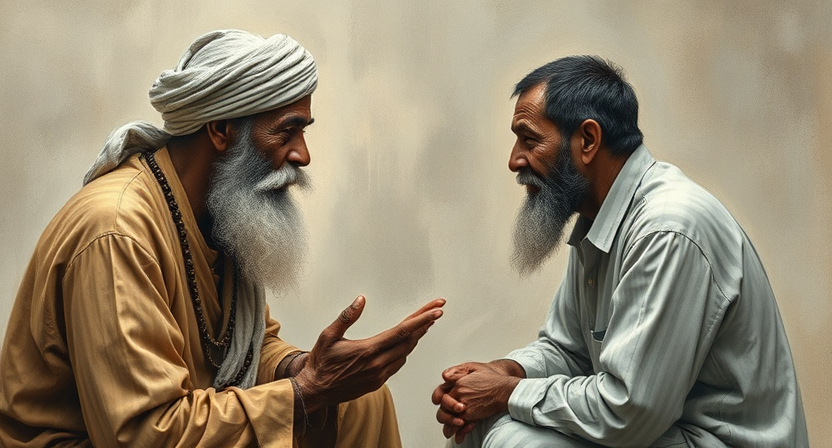In contemporary India, the term "baba" has become synonymous with a troubling blend of spirituality and exploitation. While some spiritual leaders genuinely seek to guide their followers towards enlightenment, a significant number have exploited this trust for personal gain, engaging in heinous acts such as sexual abuse, financial fraud, and even murder. This editorial examines the darker side of baba culture through the lens of notorious figures like Gurmeet Ram Rahim Singh and others who have tarnished the image of genuine spirituality.

The Rise of the Modern Baba
The phenomenon of self-styled babas has proliferated in India, capitalizing on deep-rooted superstitions and the desperate need for guidance among the populace. Many followers turn to these figures during times of personal crisis, seeking solace in their promises of miraculous powers and divine intervention. However, as history has shown, this vulnerability is often exploited. Gurmeet Ram Rahim Singh, leader of the Dera Sacha Sauda sect, serves as a prime example. Convicted of raping two female disciples and implicated in multiple other crimes, including murder and castration of followers under the guise of spiritual purification, Ram Rahim’s story exemplifies how these so-called spiritual leaders can wield immense power while perpetrating unspeakable acts.

Notorious Figures in Baba Culture
Several babas have been implicated in serious criminal activities that highlight the dark underbelly of this culture:
- Gurmeet Ram Rahim Singh: The head of Dera Sacha Sauda was convicted in 2017 for raping two female followers and sentenced to 20 years in prison. In 2019, he was sentenced to life imprisonment for the murder of journalist Ram Chander Chhatrapati, who had exposed his sexual exploitation of women. Additionally, he was involved in the murder of former Dera manager Ranjit Singh and accused of forcibly castrating around 400 followers between 1999 and 2000 under the pretext of spiritual enlightenment.
- Asaram Bapu: Another high-profile case involves Asaram Bapu, who was convicted in 2018 for raping a minor girl at his ashram in Rajasthan. He is serving a life sentence for this crime, which has drawn attention to the manipulative tactics employed by some spiritual leaders to exploit vulnerable individuals.
- Nirmal Baba: Known for his controversial claims about miraculous powers, Nirmal Baba has faced allegations related to financial scams involving large sums collected from followers under dubious pretenses. His practices often blur the lines between genuine spirituality and exploitation.
- Radhe Maa: This self-styled guru has been embroiled in various controversies involving allegations of fraud and manipulation. She gained notoriety for her extravagant lifestyle while preaching spirituality to her followers.
The Facade of Spirituality
Many babas maintain a facade of benevolence through purported social work and community service. They often present themselves as messengers of God, claiming to possess unique insights into spirituality that can heal physical and emotional ailments. For instance, Nirmal Baba—who charges exorbitant fees for entry to his sessions—claims to have achieved nirvana and offers bizarre advice that ranges from dietary suggestions to dubious healing practices. Such antics not only mock genuine spiritual teachings but also reinforce harmful stereotypes about spirituality being intertwined with superstition.
The Intersection of Faith and Politics
The intertwining of baba culture with politics exacerbates the issue. Politicians often seek alliances with these spiritual leaders to sway voters, creating a toxic environment where faith is manipulated for electoral gain. The political patronage afforded to figures like Ram Rahim has allowed them to operate with impunity, creating parallel power structures that challenge state authority. This relationship is particularly dangerous; it legitimizes their actions in the eyes of their followers while simultaneously undermining legal accountability.

The Psychological Manipulation
The psychological tactics employed by these babas are alarming. They often exploit followers' insecurities and fears, presenting themselves as the only solution to their problems. This manipulation is compounded by societal pressures that encourage blind faith in spiritual leaders. The herd mentality further entrenches these figures’ power; individuals are less likely to question authority when surrounded by a community that fervently supports it.
Real Gurus vs. Fraudulent Babas
Despite the overwhelming presence of fraudulent babas, there are genuine spiritual leaders who strive to uplift humanity without exploiting their followers. Figures like Meher Baba represent a stark contrast to the likes of Ram Rahim. Meher Baba dedicated his life to serving others and promoting love and compassion without seeking personal gain or recognition. Such leaders remind us that true spirituality fosters community and healing rather than division and exploitation.
Conclusion: A Call for Awareness
The dark side of baba culture serves as a cautionary tale about the dangers of blind faith and the exploitation inherent in spiritual hierarchies. As society grapples with these issues, it is crucial for individuals to cultivate discernment in their spiritual journeys. Education about genuine spirituality versus manipulation can empower followers to seek authentic guidance while protecting themselves from predatory practices.In conclusion, while some babas may offer solace and community, it is imperative to remain vigilant against those who exploit faith for personal gain. By fostering critical thinking and promoting awareness about the complexities within baba culture, society can begin to dismantle the harmful narratives that allow such abuses to persist unchecked.

How do legal systems handle cases involving religious leaders?
Legal systems around the world handle cases involving religious leaders with a complex interplay of civil rights, religious freedoms, and the principles of justice. The approach can vary significantly based on the legal framework of each country, the nature of the allegations, and the specific religious context. Here’s an overview of how different legal systems manage these cases.
General Principles in Handling Cases
- Application of Civil and Criminal Law: In many jurisdictions, courts apply the same civil and criminal laws to religious entities as they do to secular organizations. This means that if a religious leader is accused of a crime, such as sexual abuse or fraud, they are subject to the same legal repercussions as any individual outside of a religious context. For example, cases involving sexual abuse by clergy members have led to significant legal actions against religious institutions, particularly within the Catholic Church, where numerous lawsuits have been filed against dioceses for the actions of priests.
- Ministerial Exception: In the United States, there exists a legal doctrine known as the "ministerial exception," which allows religious organizations to make employment decisions about their clergy without interference from anti-discrimination laws. This principle has been upheld in various cases where courts have ruled that religious organizations have the right to hire and fire clergy based on their adherence to religious beliefs. However, this exception has led to debates about its limits and applications, particularly regarding allegations of misconduct.
- First Amendment Protections: The First Amendment in the U.S. provides significant protections for religious organizations, preventing government interference in internal matters. Courts generally refrain from adjudicating disputes that require interpretation of religious doctrine or theological issues. For instance, while courts can resolve property disputes within a church based on secular law, they typically avoid ruling on matters such as excommunication or doctrinal disputes.
Specific Cases and Contexts
- Internal Disputes: Many religious groups have their own internal mechanisms for handling disputes involving their leaders or members. For example, in some Christian denominations, allegations against clergy may be addressed through church tribunals or boards that investigate complaints and impose disciplinary actions. These internal processes often prioritize rehabilitation over punishment but can lead to significant challenges when allegations involve criminal behavior.
- Religious Courts: In some cultures and legal systems, particularly within Islamic communities, there are parallel legal systems that operate under religious law (such as Sharia courts). These courts handle personal law matters like marriage and divorce but have faced scrutiny regarding their authority compared to state courts. In India, for instance, the Supreme Court has recognized that while these religious courts can operate independently for certain matters, their decisions must not contradict individual rights granted by the Constitution.
- Public Scrutiny and Accountability: High-profile cases involving religious leaders often attract media attention and public scrutiny, leading to increased pressure on legal systems to hold these individuals accountable. Notable figures like Gurmeet Ram Rahim Singh in India have faced severe legal consequences for crimes including sexual assault and murder, demonstrating that even powerful religious leaders are not above the law.
Conclusion
The handling of cases involving religious leaders is marked by a delicate balance between respecting religious freedoms and ensuring accountability under civil law. As societies evolve and public awareness of misconduct increases, legal systems are increasingly challenged to address these issues transparently while navigating the complexities of faith-based governance. Ultimately, fostering an environment where both spiritual guidance and legal accountability coexist is crucial for upholding justice in cases involving religious figures.
With inputs from agencies
Image Source: Multiple agencies
*The views expressed are personal to the author and do not reflect the platform's opinion of the same.
© Copyright 2024. All Rights Reserved Powered by Vygr Media.


























